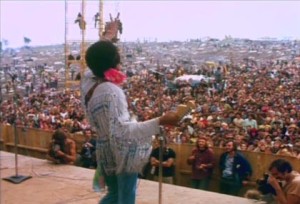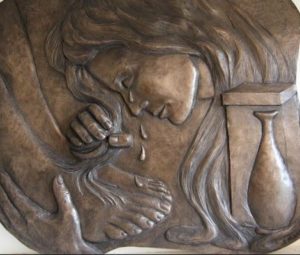Why Did Dustin Morgan Cry at Woodstock?
Excerpt from “From Woodstock To Eternity”
The images of the last three days roll through his mind like a video. The overwhelming onslaught of people from everywhere. The gathering of the tribes. The exhilarating swells of peace and brotherhood. The generosity of the hog farm, the open market of psychedelic drugs. The acid reports. The smiles on everybody’s faces, the “hello, brother”, “hello, sister”, “peace, man”, “this is far out, really far out”. Jimi says it all in his brief chatter between songs,
“You proved to the world what can happen,” he says, “A little bit of love, and understanding, and sound.”
Hendrix goes straight from “Voodoo Child” into the opening notes of “The Star Spangled Banner”. He raises his arm high in a salute to the crowd, his fingers formed into the peace sign. The adoring audience flashes the sign back in unison. The twisted, exploding version of the National Anthem paints the picture of everything the revolution stands for, and Morgan knows he is part of it. Woodstock has sealed the deal; he has sold his soul. A great swelling of emotion rises up in his heart, and he cannot contain it. He raises both hands into the air, with his fingers forming the “V”, and cries like a baby.
exploding version of the National Anthem paints the picture of everything the revolution stands for, and Morgan knows he is part of it. Woodstock has sealed the deal; he has sold his soul. A great swelling of emotion rises up in his heart, and he cannot contain it. He raises both hands into the air, with his fingers forming the “V”, and cries like a baby.
Why did he cry? He just had an overflowing sense that all the Woodstock movement stood for was the real thing. And because it was the real thing, he was obligated to devote himself entirely to it. It was going to transform the world, it was based on brotherly love, and it just felt so good to be a part of it. But some people were not going for it…
“If they think I’m going to grow my hair out and wallow in the mud, they got another thing comin’!”
In time, the innocent Peace and Love movement began to mutate into forms that were not very pretty…
Just as this generation of free spirits was certain that the Great Establishment wanted to enslave them and force their ways down their throats, they adopted the same role of tyranny, forcing their ideas of how things should be down everybody else’s throats.
Now, the radical fanatics living in the glass dome in Eastern Wyoming really do want to make the whole world like Woodstock. They want everybody to share everything. And if you don’t want to share what you have, then into the concentration camp you go! If you don’t agree with their ideas of social behavior and political correctness, then too bad, they are going to force their view of what is right and proper on you.
— From the “Woodstock” chapter
Unfortunately or fortunately, however you see it, the Woodstock fever faded away after a few short years. Oh, it’s still around in aging hippies, hip centers and liberal ideology, but the massive wave of hip culture has been pushed into obscurity. On the other hand, consider a fever that has not faded away, but has only grown over the last 2,000 years. Consider the woman at Bethany, anointing Jesus with costly oil and wiping His feet with her hair and her tears.
Mark 14:8-9 “She has done what she could; she has anointed my body beforehand for burial. And truly, I say to you, wherever the gospel is proclaimed in the whole world, what she has done will be told in memory of her.”
 Why was this woman crying? In many ways, for the same reason Dustin Morgan cried at Woodstock. A truth bigger than herself had revealed itself to her. A truth bigger that the earth, or the universe, had suddenly taken root in her heart. This Man before her had come down from heaven to save her and deliver her from her sin. He was God in human flesh. And He came here to show the world there is a God, and His Son is Jesus, and He is going to transform the world with His love. Not only that, He had just transformed her. Knowing that this Son Who was sitting right in front of her had taken away her sin and made her a new person demanded that she give him her full devotion.
Why was this woman crying? In many ways, for the same reason Dustin Morgan cried at Woodstock. A truth bigger than herself had revealed itself to her. A truth bigger that the earth, or the universe, had suddenly taken root in her heart. This Man before her had come down from heaven to save her and deliver her from her sin. He was God in human flesh. And He came here to show the world there is a God, and His Son is Jesus, and He is going to transform the world with His love. Not only that, He had just transformed her. Knowing that this Son Who was sitting right in front of her had taken away her sin and made her a new person demanded that she give him her full devotion.
So, she poured out all that she had to anoint Him for burial.
